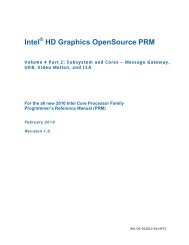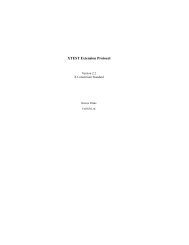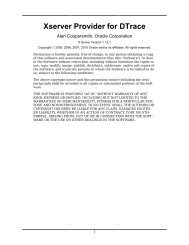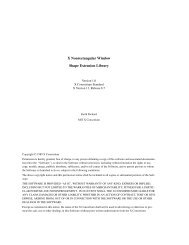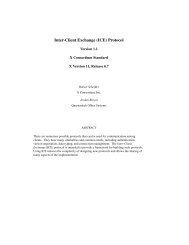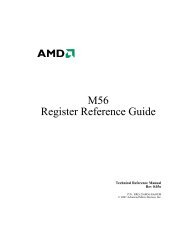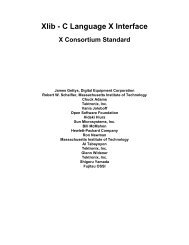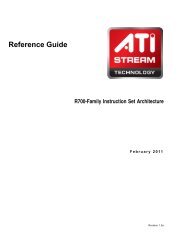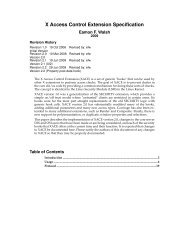Athena Widget Set - C Language Interface - X Consortium ... - X.Org
Athena Widget Set - C Language Interface - X Consortium ... - X.Org
Athena Widget Set - C Language Interface - X Consortium ... - X.Org
You also want an ePaper? Increase the reach of your titles
YUMPU automatically turns print PDFs into web optimized ePapers that Google loves.
Using <strong>Widget</strong>snum_argsSpecifies the number of arguments in the argument list.The arguments and values that are passed will depend on the widget being modified.Some widgets may not allow certain resources to be modified after the widgetinstance has been created or realized. No notification is given if any part of aXt<strong>Set</strong>Values request is ignored.For further information about these functions, see the X Toolkit Intrinsics - C <strong>Language</strong><strong>Interface</strong>. The argument list entry for XtGetValues specifies the addressto which the caller wants the value copied. The argument list entry for Xt<strong>Set</strong>-Values , however, contains the new value itself, if the size of value is less thansizeof(XtArgVal) (architecture dependent, but at least sizeof(long)); otherwise, it isa pointer to the value. String resources are always passed as pointers, regardlessof the length of the string.Using the Client Callback <strong>Interface</strong><strong>Widget</strong>s can communicate changes in their state to their clients by means of a callbackfacility. The format for a client's callback handler is:void CallbackProc( w, client_data, call_data);wclient_datacall_dataSpecifies widget for which the callback is registered.Specifies arbitrary client-supplied data that the widgetshould pass back to the client when the widget executesthe client's callback procedure. This is a wayfor the client registering the callback to also registerclient-specific data: a pointer to additional informationabout the widget, a reason for invoking the callback,and so on. If no additional information is necessary,NULL may be passed as this argument. This field isalso frequently known as the closure.Specifies any callback-specific data the widget wantsto pass to the client. For example, when Scrollbar executesits jumpProc callback list, it passes the currentposition of the thumb in call_data.Callbacks can be registered either by creating an argument containing the callbacklist described below or by using the special convenience routines XtAddCallbackand XtAddCallbacks. When the widget is created, a pointer to a list of callbackprocedure and data pairs can be passed in the argument list to XtCreate<strong>Widget</strong> .The list is of type XtCallbackList :typedef struct {XtCallbackProc callback;XtPointer closure;} XtCallbackRec, *XtCallbackList;The callback list must be allocated and initialized before calling XtCreate<strong>Widget</strong> .The end of the list is identified by an entry containing NULL in callback and closure.14



